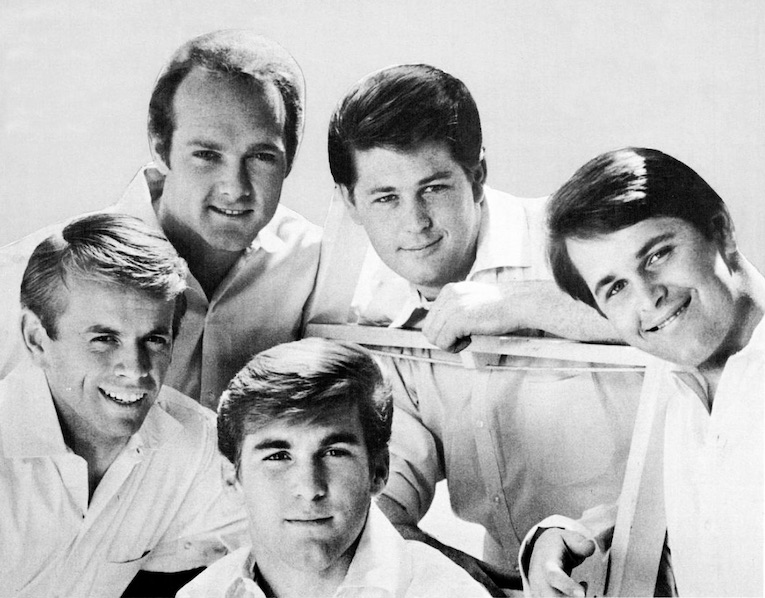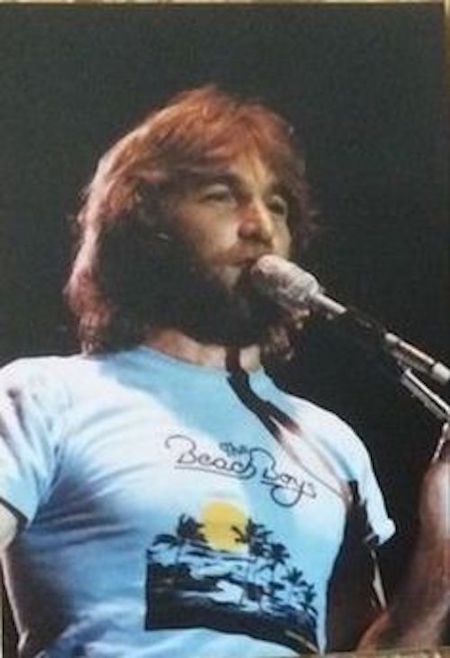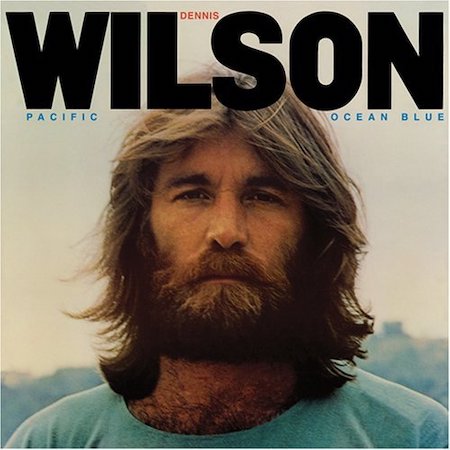
Photo: The Beach Boys 1965 Creative Commons
Dennis Wilson: Pacific Ocean Blues
By Jay Luster
On December 25th 1983, Beach Boy Dennis Wilson checked himself out of rehab. Three days later, he was dead.
Shortly after Christmas in 1983, in the icy waters of Marina Del Rey, Beach Boy Dennis Wilson drowned. He had polished off a fifth of vodka, and was diving off of a friend’s yacht hoping to find discarded bits and pieces of his former life. He’d returned to the surface shivering, with an old frame containing part of a picture of his estranged wife, Karen Lamm. After she left him, he had drunkenly tossed many of their mementos overboard, and he wanted them back. Wilson’s own yacht, The Harmony, had been berthed in the next slip over until the bank repossessed it two years earlier. Due to Wilson’s burgeoning drug and alcohol problems, he had fallen behind on his payments and the bank loan went unpaid. Now, Dennis was broke, homeless, and sleeping on friends’ couches.
His passing made headlines all over the world, and sent shockwaves throughout the music industry. Dennis continued touring throughout 1983, but with his declining health, he was forced to share drum duty with Mike Kowalski. For the 1984 Beach Boys July 4th concert on the Washington DC Mall, attended by three quarters of a million fans, as a tribute to Dennis, Ringo Starr sat in with the band. While his death didn’t stop the Beach Boys from continuing to record, and tour, an integral piece of their family was gone.
Overlooked as a creative force, Dennis Wilson was the only actual beach boy in The Beach Boys. An avid surfer, it was his suggestion, in 1961, to his older brother Brian, which inspired the song “Surfin’”. It went on to be a minor hit for the kids from Hawthorne, California, and the beginning of an era now spanning sixty years. Throughout their rise to fame, Dennis probably enjoyed the perks that went along with being a rock and roll star, a bit more than the work that went into it. He was the sex symbol in the band, and whenever the girls rushed the stage, it was him they were rushing after. In early concert photos, he is the handsome kid with the long hair, and dimpled chin, smiling from behind his drum kit. He seemed carefree, and glad to be along for the ride. Little by little, as things changed for the band, things changed for Dennis, and as with the band, not always for the better. Dennis’s life, and death, exemplify, both the power and allure of The Beach Boys music, and the pitfalls of a rock and roll lifestyle.

Photo: Dennis Wilson, Creative Commons
Dennis was just 16 when “Surfin’” received airplay, and Murray, the Wilson brothers’ (Brian, Dennis, & Carl) volatile dad, used his connections in the music industry to get the boys a contract with Capitol Records. Dennis’s deft drumming created the driving foundation Brian built his catchy songs upon. With their stunning harmonies, and near continuous output of top forty hits, it didn’t take long for the Beach Boys to become a media sensation, and record selling behemoth. Eventually Brian Wilson, suffering from exhaustion and a deeply misunderstood mental illness collapsed, taking him off the road. The person who felt his absence both on, and off stage most keenly, was Dennis. Without Brian, his best bud, the band became something of a daily chore. While he loved his younger brother Carl, the band’s lead guitar player, he chafed under the leadership of their authoritarian dad. His cousin, the BB’s gum chewing lead singer Mike Love, also disapproved, and it tipped off a, sometimes violent, lifelong feud. Dennis had an irrepressible free spirit and big appetites. He simply refused to conform to their unyielding constraints.
In the early 1960’s, The Beach Boys filled auditoriums with screaming kids. Oftentimes, audiences wouldn’t leave until forcing the band to play multiple encores. Dennis would spend these night’s sweating out 25 songs behind his drums, then towel off, find some girls, some booze, some pot, hop into one of his hot rods, and go pull an all-nighter. He’d usually return on time to do it all over again the next night. However, his occasional tardiness, and hangovers, gave the rest of the band anxiety. The fact is, Dennis was the cool Beach Boy. With his good looks and muscle cars, the fans, especially the groupies, knew it.
After Brian abandoned the stage for the studio, the rest of the band, with various temporary replacement musicians, which once included Glen Campbell, continued touring. Meanwhile, back in the studio, Brian, beginning with their 1965 album called Today, was composing new music with the L.A. session musicians collectively called The Wrecking Crew. From the viewpoint of the band, Brian had replaced the Beach Boys, and their guitar-driven music, with an orchestra capable of making his increasingly eccentric ideas a reality. When the band came home, no matter how exhausted, he’d hustle them into the studio and put their fabulous voices on track. While that part of the story is legendary, what isn’t part of the legend is how some of the band members felt about it.
At first, Mike Love enjoyed the arrangement. He was the lead singer, and Brian was still creating formulaic hits, like “California Girls”, which made the band famous. Carl had turned into a pretty good lead guitar player, and fabulous singer, and was frequently used in overdubs. Al Jardine was glad to be home, but noted on the back of the late 1965 Summer Days album, how exhausting the constant touring and recording actually was. Dennis, on the other hand, had been replaced on the drums, and his vocals, which were almost never prominent in the mix anyway, were all but silenced.
In 1966, Brian, with the Wrecking Crew, led by drummer Hal Blaine, wrote and recorded the backing tracks for Pet Sounds. The rest of The Beach Boys contribution to the record was mostly limited to their sterling vocals. If Dennis sang on the record, his voice is lost in the mix. When it was released, though it seemed to confuse the fans, the critics and other musicians, including The Beatles, thought it was a masterpiece, and Brian a genius. However, aside from their astounding singing on songs like “Wouldn’t It Be Nice”, “Sloop John B.”, and “God Only Knows”, the only song done by the Beach Boys as a band, which included Dennis on drums, is “That’s Not Me”. Though he’s credited as a backup vocalist on the record, this is the only place where his contribution is unquestionable.
Not long after the release of Pet Sounds, The Beach Boys would release their seminal hit “Good Vibrations”. Hailed as an instant classic, an impressed Capitol Records gave Brian practically unlimited resources for their next record. Set to be called SMiLE, it was to be one of the first real rock and roll concept albums, and would revolve around “Good Vibrations”. Alas, it was not to be. Due to his declining mental state, Brian, failed to finish the album. Many years later, it was revealed the quiet church organ in the middle of “Good Vibrations” was played by Dennis. There can be no better metaphor describing the Wilson family middle child than realizing their most rowdy, and overlooked member, played the tranquil centerpiece of the Beach Boys most famous song. Maybe that’s why, in 1967, during the recording of SMiLE, a decidedly resentful Dennis was quoted in the press saying, “Brian Wilson is The Beach Boys. He is the band. We’re his fucking messengers. He is all of it. Period.”
To fill the void left behind by Brian’s aborted masterwork, and to fulfill their contractual obligation to Capitol, the band cobbled together Smiley Smile. Despite being considered a great stoner album, longtime fans absolutely hated it. Imagine trying to reconcile the hallucinogenic, and sometimes comical songs on this record, with “Little Deuce Coupe”, and “Surfin’ USA”? The fans couldn’t keep up, and The Beach Boys went from juggernaut to afterthought in under a year. Their next album, Friends, another huge sales disaster, featured the first four songs Dennis would contribute to the band. Critics mostly liked the record, and wrote of him as someone worth watching. Brian’s illness, tragic though it was, opened the door for Dennis, and he seized the opportunity. Stepping through the door he began flexing his own creative muscles. Unfortunately, despite the peaceful, and harmonious songs he was producing, things were about to go off the rails in an unpredictable, and terrifying way.
In 1968, Dennis picked up a couple of hitchhiking girls. Their names were Patricia Krenwinkle, and Ella Jo Bailey. He gave them a ride to wherever they were going, but then encountered them hitchhiking again the very next day. He picked them up, but this time he took them to his house for milk and cookies. After their wholesome snack, they retired to the bedroom where they spent their time enjoying a threesome. It wasn’t until he got up and said he needed to go to a recording session did the ladies realize who they’d been sharing a bed with. They couldn’t believe their luck. When they went home, they told their friend, personal guru, and capricious musician, about their encounter. He was a songwriter, with a bit of talent, and desperately wanted a recording contract. That was when Dennis Wilson met the guy, he called The Wizard, Charles Manson.

Manson invited himself, and his entire entourage to Dennis’s house, where they took up residence, and pretty much wrecked the house, cars, and for a time, his life. At first, Wilson liked Charlie, and especially enjoyed the enthusiastic submissive women, and continuous party. Eventually, with all the debauchery coming out of his wallet, Wilson grew tired of it. More worrisome was Dennis’s realization that Manson might be dangerous, and maybe even insane. According to Mike Love, in his 2016 biography, called Good Vibrations: My Life As A Beach Boy, Dennis witnessed Manson murder a man. While there is no corroborating evidence, this ever happened, it is true Dennis had begun seeing Charlie as a danger to himself, and those he loved. With that in mind, he abandoned his house to them. Perhaps as a last-ditch effort to shed Charlie from his life, and intimidate him into never returning, Dennis beat, and humiliated him. After that, Charlie and his troupe of amoral followers, moved from Wilson’s house, out to Spahn Movie Ranch, where among other things, he hatched the plot for his murderous spree. It was then Dennis supposedly received a message from Manson. It was a bullet with a warning that he needed to protect his children. After the Tate/LaBianca murders, a rattled Wilson refused to testify. He believed, even if Manson and the actual murderers were convicted, there were other members of Charlie’s cult who were deadly dangerous, and still free.
The Beach Boys 1969 album 20/20, included three more Dennis Wilson songs, one of which was called, “Never Learn Not To Love”. It was originally called “Cease To Exist”, and was written by Manson. Though it was reported Charlie had given it to Dennis, Manson didn’t see it that way. Further humiliated, a furious, Charles Manson let his cult family know he wanted Wilson dead. A few months later, before making good on that threat, Manson was arrested for ordering the Tate/LaBianca slaughterings. The murders shook the world, and all but destroyed the victim’s families. As for Dennis, he had unmistakably dodged a bullet, or worse, and he knew it. It was after this, Wilson’s addiction issues were observed by friends to be spiraling out of control. Dennis himself chose not to talk about Manson ever. He refused to talk to the police, or the press, and neither did the rest of the band. One way or the other, Dennis was profoundly affected by his razor thin escape.
In 1974, Mike Love would dip into the Capitol Records archives and release the greatest hit’s collection Endless Summer. He followed it up in 1975 with Spirit of America. Those two records outsold anything the Beach Boys had done in nearly a decade. Even though they were still recording new music, and some of it was quite good, the two double records became the basis for every Beach Boys concert performed to this very day. While Love unquestionably put the Beach Boys on a path to financial success and their return to the type of prominence, which could put three-quarters of a million people on the DC Mall, The Beach Boys, despite Dennis’s forward looking music, were doomed to become a traveling oldies act selling an increasingly anachronistic California myth.
In 1977, Dennis Wilson wrote, and produced his first, and only completed, studio album called, Pacific Ocean Blue. Reminiscent of his peaceful organ playing on “Good Vibrations” eleven years earlier, the record evoked a harmonious soulfulness decidedly incongruent with the publicly mercurial man. It was unlike the nostalgia inducing Beach Boys formulaic music Mike Love brought to the stage, and the music critics loved it. Though it only sold a modest 300,000 copies, it has been cited as an influence by many artists, including The Flaming Lips, The Foo Fighters, and Queen. Wilson’s next record was going to be called Bambu, but it was unfinished at the time of his death. In 2008, thirty years after its original release, Sony Legacy released a double CD set called Pacific Ocean Blue & Bambu Legacy Edition. Up until then, Bambu only existed in bootleg form, and while still incomplete on this release, it does bring the listener closer to Wilson. Later, Brian May, and Roger Taylor of Queen, teamed up with Taylor Hawkins of The Foo Fighters to complete the Bambu track “Holy Man”. Wilson said, when completed, Bambu would be a hundred times better than Pacific Ocean Blue. Considering the albums status as an underground classic, you have to wonder what Bambu might have been had he lived to finish it.
Over the next six years, Dennis’s presence on stage, became increasingly erratic. Described by Love as a “drugged-out no-talent parasite,” he had, by the middle of 1983, lost everything, including his voice. With five failed marriages, including one with Love’s illegitimate daughter Shawn, and six children, in his wake, it is sad he ended up at the bottom of the Pacific Ocean. It was his love of the Pacific coast beaches which had originally given rise to the Beach Boys. On the liner of the 1964 album, All Summer Long, he wrote, “They say I live a fast life. Maybe I just like a fast life. I wouldn’t give it up for anything in the world. It won’t last forever, either. But the memories will.” In a song called, “Carry Me Home”, which was unaccountably left off of the Beach Boys 1972 Holland album, and every other album since, Dennis Wilson wrote, “ The rain’s fallin down on me. The wind is blowin’ cold. My eyes are gettin’ tired. I guess I won’t grow old.”
Dennis Wilson 4 December 1944 – 28 December 1983

Murry Wilson (Dennis etc’s Dad) had already been sacked as the band’s manager before Brian quit touring and wasn’t the Dennis quote about Brian being The Beach Boys and them his *bleep-ing* messengers from the mid/late 70s?
After being fired Murray Wilson remained a constant, and meddlesome presence. He inserted himself into Brian’s business dealings, which included the negotiations with Capitol that allowed Brian to stop touring.
The Dennis Wilson quote was a response to a reporter during the summer of 1967. Leonard Bernstein, in April 67, had called Brian a genius on national TV. That drew in the press like flies at a picnic. It was June, or July 1967 when different versions of the quote started appearing in the press. I haven’t been able to track down the first date of publication, but by that time Dennis knew Smile had already failed, and the band was scrambling to get Smiley Smile together. I am confident in my research.
Great article
Thanks
Jimmy